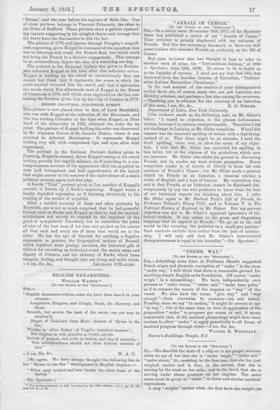"ANNALS OF CAESAR."
[To THE EDITOR OT THE " SPECTATOR."1 SIR,—In a recent issue (November 18th, 1911) of the Spectator there was published a review of my " Annals of Caesar." Your reviewer is greatly displeased with my estimate of Fronde. But this was necessary, inasmuch as there are stilT some readers who consider Froude an authority on the life of Caesar.
But your reviewer also has thought it best to refer to. another work of mine, the " Teetimonium Animate," of 1905 (v. Spectator, June 12th, 1909). He seems to be in doubt as to the Latinity of animae. I need not say that that title was- borrowed from the familiar treatise of Tertullian, " Teatime nium Animae Naturaliter Christianae."
In the vast number of the readers of your distinguished review there are, of coarse, many who are not Latinists nov Divinity scholars, and perhaps a few also among the reviewers. —Thanking you in advance for the courtesy of an insertion, [Our reviewer sends us the following note on Mr. Sihler's letter : "I raised no objection to the phrase testimonium animae, because it is entirely unobjectionable. Therefore I did not challenge its Latinity, as Mr. Sillier complains. What I did. censure was the incorrect spelling of animal, with a diphthong_ instead of ac. That there might be no mistake, I used the word spelling,' twice over, to show the cause of my objec- tion. n.
.I note that Mr. Sihler has corrected his spelling its this letter, but at the expense of his quotations, which now are incorrect. Mr. Sihler also shifts his ground in discussing Franie, and be evades my most serious accusation. Every competent reader is, of course, at liberty to form his own estimate of Froude's Caesar ; but Mr. Sillier made a general. attack on Fronde as an historian, a classical scholar, a. writer of English, and a man of honour. My contention was, and is, that Froude, as an historian, cannot be dismissed con- temptuously by any one who professes to know what the best' of our historical experts are thinking about him. I refer Mr. Sihler again to Mr. Herbert Paul's Life of Fronde, to. Professor Pollard's Henry VIII., and to Volume V. in Thus Political History of England, by Mr. Fisher. But my gravest objection was not to Mr. Sihler's apparent ignorance of his- torical verdicts. It was rather to the gross and disgusting language that he applied 'to Fronde : To go on to the end' would be like counting the pustules on a small-pox patient.' Such methods exclude their author from the pale of scholar- ship. I will only add that Mr. Sihler's controversial disingenuousness is equal to his brutality."—En. Spectator.]


















































 Previous page
Previous page